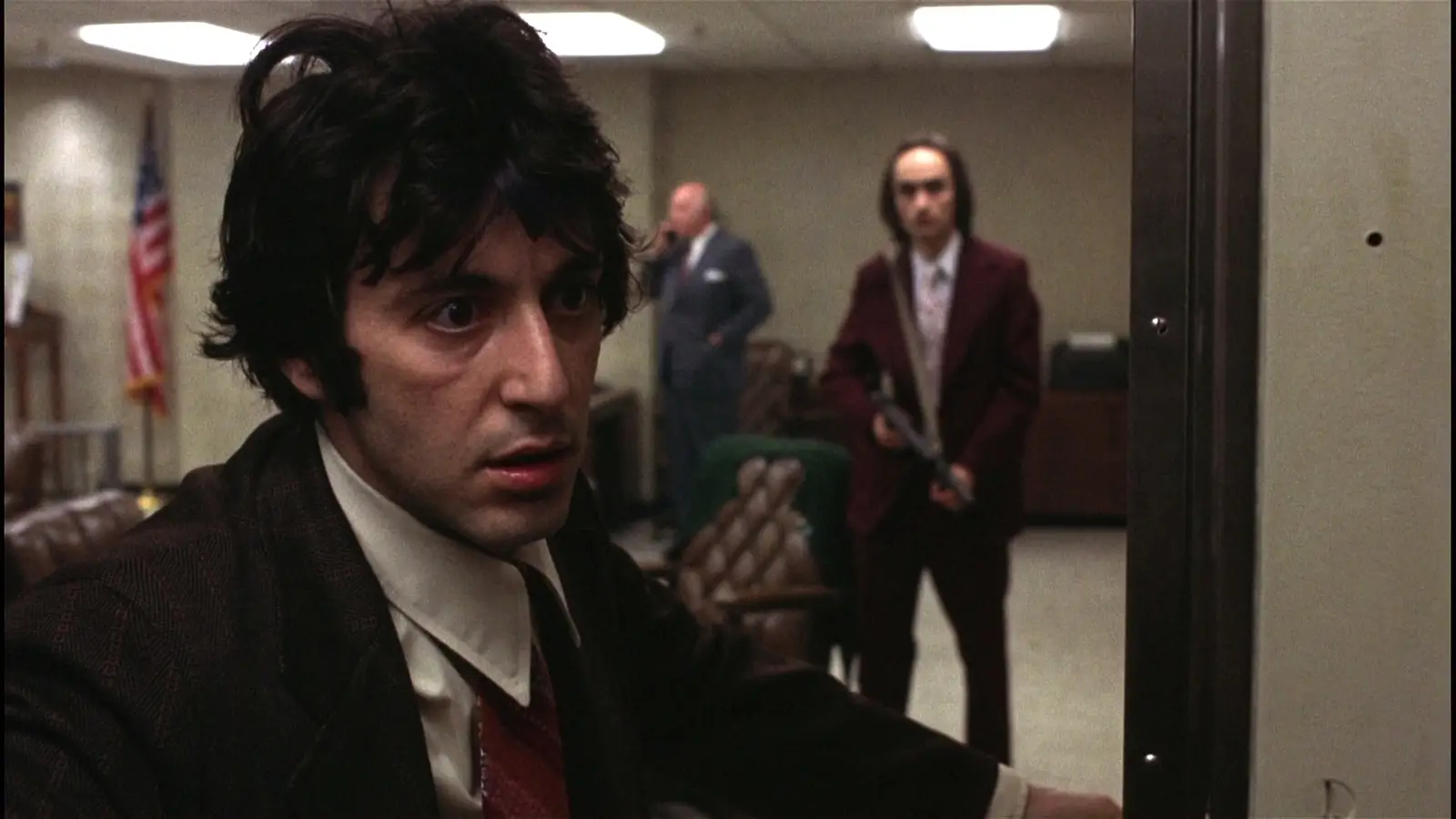
If you travel to the address of the Brooklyn bank that Al Pacino holds up in the classic thriller/comedy/drama Dog Day Afternoon, you’ll find a private apartment building in a desirable neighborhood that doesn’t much resemble the ramshackle city block depicted in that movie half a century ago. (It might, however, turn up on the big screen nearby; the Nitehawk Cinema Prospect Park down the street shows frequent revivals.) This makes sense; urban blocks rarely stay the same for one decade, let alone five. But Dog Day Afternoon itself feels like less of a time capsule than contemporary viewers might expect, especially for a movie based on actual events.
Pacino plays Sonny, a desperate Vietnam veteran who attempts to rob a Brooklyn bank — to pay, we eventually learn, for gender reassignment surgery for his lover Leon (Chris Sarandon). Leon isn’t involved in the robbery itself. For that, Sonny turns to Sal (John Cazale) and Stevie (Gary Springer). Though Sonny seems to have a clear smash-and-grab plan based on his past experience as a bank worker, he doesn’t give the impression of knowing Sal and Stevie particularly well, as if he grabbed the first two guys he recognized off the street. (Stevie, in one of the Dog Day’s funniest moments, bails as soon as the robbers pull out their guns, then whines about how he’s supposed to get home when Sonny reminds him not to take the getaway car.) This leaves Sonny in a sweaty situation when he realizes the bank’s safe has been cleared out earlier that day, and someone has called the cops. Soon he’s in a standoff with a gaggle of police officers and holding the bank employees hostage.
Sonny’s predicament also draws a crowd, and that’s where the movie feels most current. Though it’s set far before the advent of cable news or the internet, Dog Day Afternoon nonetheless recognizes the social nature of certain newsworthy events. The crowd outside the bank instinctively sympathizes with Sonny, especially once he starts playing to them when he ventures outside the bank, at one point tossing some of his meager robbery crash to onlookers. He pays for the pizza the cops order for the hostages, and the delivery guy glories in the small sliver of attention he receives. Director Sidney Lumet holds the camera on him after the main characters have gone back inside the bank: “I’m a fucking star!” he exclaims, in celebration of his brief potential appearance on the news.
The movie’s central subject isn’t fame or the media, which makes its references to them play even better; the sensationalism is just a part of life. Whipping the crowd into a frenzy in one of the film’s most famous moments, Sonny chants “Attica! Attica!” making reference to the then-recent prison riot of 1971 over poor living conditions (the movie is set in 1972, like the real incident that inspired it).
The connection seems impulsive and maybe even superficial, just something Sonny says to rile up his impromptu supporters. Pacino’s performance makes this clear early on, as he dashes around the bank, scattered across various tasks (disabling cameras, emptying cash drawers) that make sense individually but seem frantic as the camera follows Pacino around the room. But “Attica!” does speak to Sonny’s genuine frustrations. In conversation with a local news broadcast, he recounts his difficulty finding well-paying work (though, in a detail more 1975 than 2025, he mentions the pervasiveness of union jobs as a limiting factor).
In proto-social-media fashion, the crowd does eventually turn on Sonny, seemingly connected to the revelation that he’s bisexual. (He also has a wife and kids, which doesn’t help his image much when combined with his other relationship.) It’s not pleasant, but it’s plenty realistic — and given the trans panic of the past few years, it doesn’t seem that far off from 2025. With all of that in mind, the filmmakers’ treatment of what is now understood as a trans character is remarkably progressive. She isn’t characterized as a malevolent influence on Sonny, or some kind of kink for him; Chris Sarandon’s few scenes convey that Leon is struggling, just as Sonny is, and there’s a sense that, if anything, it’s Sonny who has recklessly overinvested in her, emotionally speaking. It’s not that Leon has deceived him in any way, but that Sonny clings to Leon as a motivator, even as the likelihood of success rapidly declines. Getting money for the operation is a plan, even if it ultimately seems half-baked, and only gets worse when Sonny is put in the position to make demands.
Some of this haplessness is funny. The first 30 or 40 minutes of Dog Day Afternoon play like a comedy of errors. It’s not necessarily what one might expect from Lumet and Pacino, and their groundedness makes it even funnier. Though it doesn’t come across like a serious heist picture, the mechanics of the situation are similar. For a thriller to work on that genre level, the audience has to believe that the protagonist might manage to find a way out (even if they ultimately don’t). A comedy functions similarly.
Instead, like a news event that inspires a flurry of jokes on social media before a real-world grimness emerges, Sonny’s unwinnable situation becomes increasingly palpable, and the movie’s thriller overtones re-emerge with a sense of dread for his fate. The crowd’s one-time adulation will not save him. His eventual rapport with the hostages will not save him. And the police, even as they insist they want to help defuse the situation, will not save him.
Lumet plays fair here; despite the many laughs, there’s never any particular visual or tonal indication that Sonny will come out of this ahead, or even break even. Yet he never becomes fully unsympathetic, because as muddled as both his methods and motivations ultimately are, his desperation comes through from the first moment Pacino is on screen. He doesn’t have enough money, and all things considered, that’s his primary obstacle, whether he’s taking care of his family or running off with Leon. Like so many desperate people before and since, what Sonny lands on for a solution doesn’t really make logical sense in the long run. Yet the long run is exactly where this kind of impulse resonates. The period details of Dog Day Afternoon may have shifted, but its real subject remains pervasive all across the United States: it’s about people who feel like they have no other choice.
Dog Day Afternoon is currently streaming on HBO Max.



